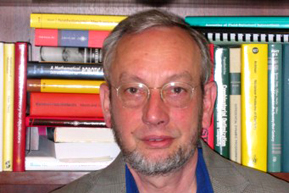From Humans to Robots
The evolving applications of control theory to devices, networks, and life itself

Click here to watch John Baillieul on BUniverse.
In the inaugural College of Engineering Distinguished Lecture, John Baillieul, a professor of aerospace and mechanical engineering, discusses several concepts related to control theory, from the study of human-robot interactions to the failure mechanisms of biological networks. The Distinguished Lecture series was created to honor annually a faculty member engaged in outstanding research.
Baillieul talks about autonomous vehicles, robots, feedback loops, networked systems, and the role that communications technologies have played in networked systems. He touches on the role of risk and the cost of complexity-based risk in an engineering project, and he argues that recent scientific advances have made it possible to think of all cellular biology as a series of very complex chemical reactions that are programmed by genes. One of the great problems, he says, is the mystery of protein folding, or protein bonding. He mentions Leventhal’s paradox, which states that it is statistically impossible for proteins to fold up the right way, yet they do that time and time again. He talks about the planar theory of graph rigidity and takes questions from the audience.
March 5, 2008, 4 p.m.
Life Science and Engineering Building
Video length is 01:07:14.
About the speaker:
John Baillieul is a professor of aerospace and mechanical engineering, electrical and computer engineering, and manufacturing engineering at Boston University’s College of Engineering. His research deals with robotics, the control of mechanical systems, and mathematical system theory. He has done research and written about the connections between optimal control theory and what has recently been called “sub-Riemannian geometry”; problems in the control of nonlinear systems modeled by homogeneous polynomial differential equations; the control theory of rotating elastic systems; motion planning and control of kinematically redundant manipulators; and problems associated with anholonomy in planning motions for robots that have elastic joints and other components that store energy.
Baillieul earned a B.A. from the University of Massachusetts, Amherst, an M.M. from the University of Waterloo, and an M.S. and a Ph.D. from Harvard University.
Comments & Discussion
Boston University moderates comments to facilitate an informed, substantive, civil conversation. Abusive, profane, self-promotional, misleading, incoherent or off-topic comments will be rejected. Moderators are staffed during regular business hours (EST) and can only accept comments written in English. Statistics or facts must include a citation or a link to the citation.